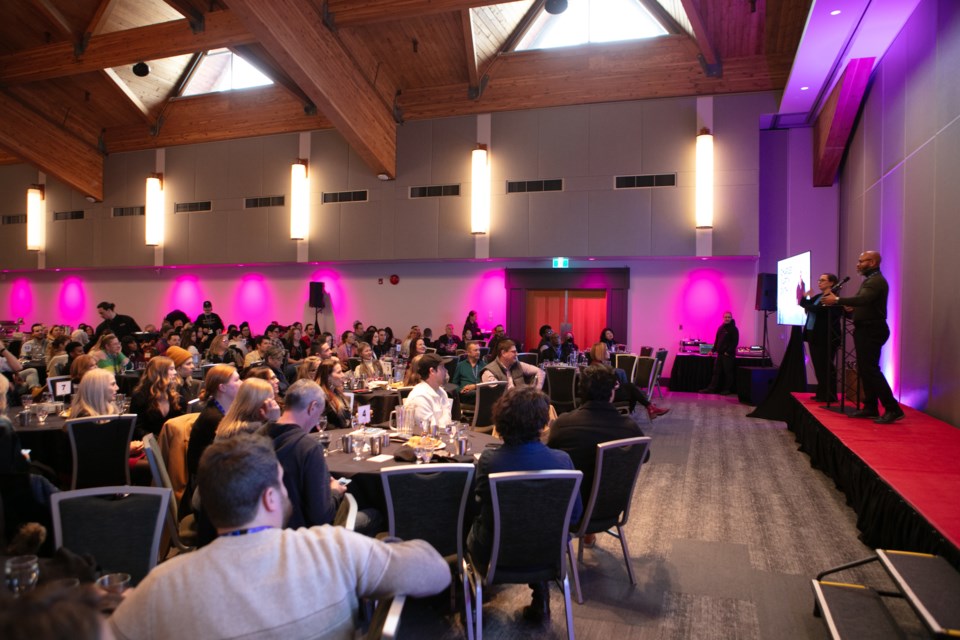If numbers are any indication, the Whistler Film Festival (WFF) is in good shape.
The most recent edition of the festival offered a total of 98 films, including eight that are in contention for Academy Awards come March: Barbie, Oppenheimer, Maestro, American Fiction, Origin, Perfect Days, May December, and Rojek. 71 Canadian productions premiered as well, including 23 feature-length movies and 48 shorts.
It all added up to 13,013 total attendees: a 14 per cent increase from 2022 and a bump of five per cent compared to 2019. Just over 8,000 guests participated in both the WFF’s in-person and online offerings, while nearly 1,850 showed up to special events like the opening night reception, awards celebration, festival party and two luncheons.
“2023 was one of our best years ever,” says WFF executive director Angela Heck. “Overwhelmingly positive. We saw the audiences really coming back in a very strong way. There were a lot more first-time festival goers coming from outside of Whistler, so people were making the trip, and that's really encouraging for us for positive growth for the future.”
“While total summit attendance is not quite back to pre-pandemic levels, this is an incredible accomplishment, especially due in part to the difficulties brought on by actor/writer strikes earlier this year.”
B.C. viewers comprised 60 per cent of attendees, including 23.3 per cent from the Sea to Sky corridor and 31.1 per cent from Lower Mainland. 25.5 per cent of attendees joined from Manitoba, with 5.3 per cent of attendees from Alberta and 6.7 per cent from other provinces. The WFF also attracted some international audiences, with 2.5 per cent primarily from the United States.
Professional attendance also remained solid, with 2,211 industry representatives in the mix (a two per cent increase from 2022) including 775 accredited industry delegates.
Days before the event was scheduled to kick off, and caused considerable damage, spray-painting and deploying fire extinguishers in the venue. Fortunately, WFF staff and volunteers laboured to ensure that the crime did not unduly impact festival programming.
“What could have been a major crisis with the vandalism of Village 8 days before opening night turned into a success story as we received support from the property managers and our volunteers to ensure a seamless guest experience,” Heck continues. “Whistler’s achievement has been truly remarkable, and the team deserves accolades. Even the weather worked out.”
Awards roundup
Chloé Leriche’s received the Borsos Award for Best Canadian Feature, while by Dianne Whelan claimed the Audience Award. Meanwhile Altona, the World Documentary Award winner, set a WFF record for single film online sales, driven primarily by Manitoba-based viewers.
The Affolter Brothers-helmed movie explores the impact of grief in a rural town after a violent murder and has sparked notable discourse since its release.
“It feels like all of Manitoba watched [Altona],” remarks Heck. “It was a surprise just how well it’s done.”
A team of 51 staff, including five employees and 46 contractors, helped make the 2023 WFF possible alongside 96 volunteers who contributed more than 944 hours over the course of the event.
“We had a 75 per cent increase in our volunteers,” Heck points out. “The support of the community was really important from our accommodation partners, our hospitality partners and the volunteers.”
WFF-sponsored talent programs also made a splash, providing a career-building experience for 82 Canadian artists throughout the year in addition to networking opportunities at the in-person festival. Three provincial training initiatives were developed for Saskatchewan, Prince Edward Island and Newfoundland & Labrador. Overall, networking opportunities saw a 52 per cent increase in participant attendees, alongside 31 faculty and 41 industry guests.
Oscar Wolfgang won the Power Pitch contest with Ginger, while the MPPIA Short Film Pitch crowned Sasha Duncan and easybake.
In other news, applications for this year’s program are open until Feb. 15.



